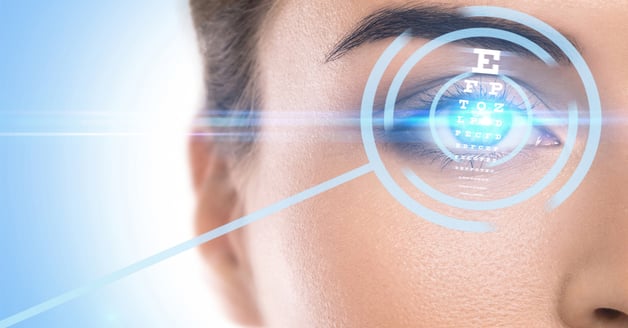
If you wear glasses or contact lenses, you’ve most likely considered or at least wondered about laser surgery to correct your vision. Just imagine undergoing a quick, painless procedure, and never having to wear glasses or contacts again!
It’s true that LASIK surgery (laser-assisted in situ keratomileusis — the most popular type of laser vision correction) is a quick and generally painless procedure. And, it’s also true that the technology has improved in the 20 years since it first became widely available in the U.S. However, even the most routine of surgeries is still surgery, meaning it carries a level of inherent risk. And, there are situations in which the LASIK procedure is most effective, and when it may not be the best option.
So, let’s break down how you can tell if you’re a good candidate for LASIK surgery.
You’re over 18 years old
At this time, LASIK surgery is not approved by the FDA for patients under the age of 18.
Your eyes are generally healthy
Since successful LASIK surgery relies heavily on your eye’s ability to heal quickly, you won’t be able to get surgery if you have any kind of injury or acute condition affecting your eye. Examples would be conjunctivitis, infection, or chronic severe dry eye syndrome.
Likewise, if you have cataracts or glaucoma that’s not completely controlled medically, your surgeon will recommend you have those issues resolved before moving ahead with LASIK surgery.
Your immune system is healthy
For similar reasons, health conditions that are caused by (or can cause) a weakened immune system may disqualify you from LASIK surgery. Nearly all negative complications that accompany the procedure revolve around something slowing or stopping the normal healing process. So, since the surgery is not vital to survival, the risk of damage to the eye is too great.
Some of these conditions include rheumatoid arthritis, type 1 diabetes, and lupus. In some cases, if the condition is present but tests indicate it is being consistently managed and the immune system is not significantly compromised, the doctor may agree to proceed with LASIK.
You’re not pregnant
Natural hormone fluctuations during pregnancy can alter the shape of your cornea. In most cases, the cornea returns to roughly its pre-pregnancy shape after your hormones return to normal levels.
For that reason, it would be silly to have your vision corrected while you’re pregnant since it will simply go bad again once the baby is born.
Your pupil is not overly large
It’s not common, but if your pupils are naturally very large, you will be more prone to negative side effects following surgery, including halo and starburst effects, especially while driving at night. Your eye doctor can measure your pupils for you.
Your corneas are not too thin
The LASIK procedure uses a laser to reshape the top surface of the cornea to correct your vision. So, if your cornea is too thin (usually less than 0.5 mm) it may not cooperate well with the reshaping process and is more likely not to heal well.
Misshapen corneas, such as those caused by keratoconus, can cause similar problems, making you a poor candidate for LASIK surgery.
Your prescription is stable
Since the goal of the LASIK surgery is to provide permanent improvement, your surgeon will not operate if your prescription has changed at all within at least the last 12 months. Some prefer to see the prescription stable for even longer.
Your prescription is within the limits
The higher your prescription, the more of your cornea will need to be removed during the reshaping process. As a result, patients with very high prescriptions are often disappointed with the results of surgery. After paying for the procedure, they may still need to wear glasses or contacts to correct their vision.
If your vision prescription is greater than +/- 6.00 diopters, LASIK may not be the best option for you. Individuals with thinner corneas may have a smaller prescription threshold.
In all these cases (except being at least 18 years old) LASIK surgeons will want to make an individualized determination before approving or denying surgery. Your personal health background and goals for surgery will factor heavily into what parameters your doctor uses to decide if you’re a good candidate. Most LASIK facilities offer free consultations for just this purpose, so take advantage of that even if you realize one or more of the items on this list may be an issue for you.
If you definitely want to move forward with LASIK surgery, consider joining the Wellness Complete program. For just $12.95 a month, you’ll receive either 15% off the standard cost of surgery or 5% off an advertised special, whichever saves you more. Plus, the LASIK discount is just one of the dozens of valuable savings opportunities bundled for this one low price. Learn more below.

